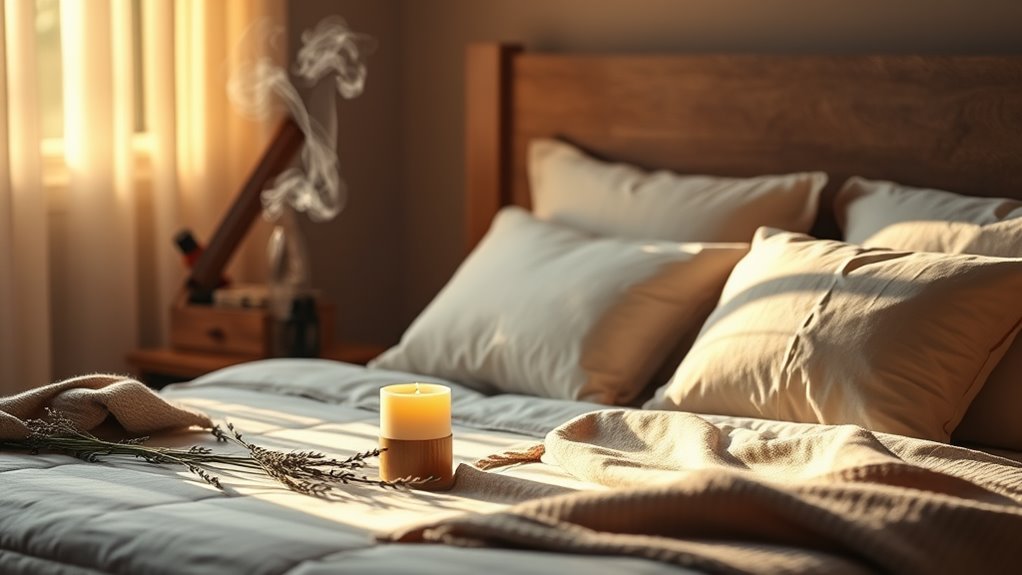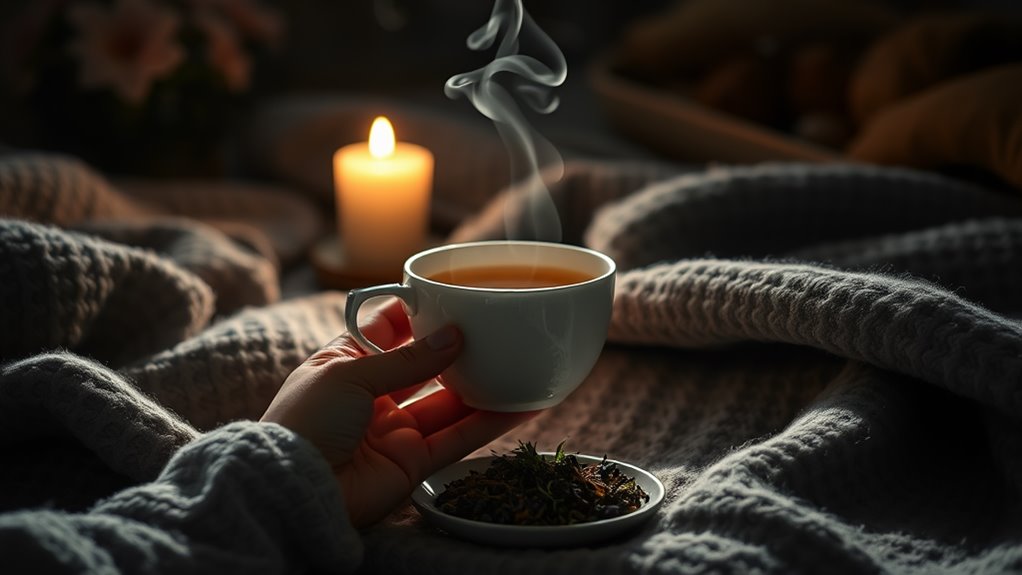One Aromatherapy Habit That Helps Me Sleep Instantly!
Imagine sinking into a cloud of tranquility as soothing scents envelop your space. If you’ve struggled with restless nights, aromatherapy might be your answer. Specifically, the use of essential oils, like lavender, has been shown to promote relaxation and reduce anxiety. This simple habit can transform your bedtime experience. Curious about how to incorporate this into your nightly routine for more restful sleep? Let’s explore the powerful impact of aromatherapy together.
Key Takeaways
- Diffuse lavender essential oil in your bedroom to create a calming atmosphere that promotes relaxation and improves sleep quality.
- Apply a few drops of chamomile oil to your wrists or neck for instant soothing effects before bedtime.
- Incorporate gentle stretching or deep breathing into your bedtime routine to enhance the calming effects of aromatherapy.
- Create a calming environment by dimming lights and turning off screens an hour before sleep, complemented by soothing scents.
- Use a lavender pillow spray to envelop yourself in a gentle aroma, helping you drift off to sleep more quickly.
The Power of Aromatherapy for Sleep
Aromatherapy harnesses the soothing power of essential oils to promote better sleep, making it a popular choice for those struggling with restless nights.
You might find that essential oils for sleep, like lavender and chamomile, create a calming environment, easing your mind and body.
Research indicates that inhaling these scents can reduce anxiety and enhance sleep quality by lowering cortisol levels.
When you diffuse these oils or apply them topically, you’re inviting relaxation into your routine. Additionally, crafting your own DIY lavender mist can further enhance your nighttime relaxation ritual, helping you unwind even more effectively.
Choosing the Right Essential Oils
How do you choose the right essential oils for enhancing your sleep?
Start by exploring oils known for their calming properties.
Lavender is a popular choice, backed by studies showing it can reduce anxiety and improve sleep quality.
Chamomile has similar effects, promoting relaxation and easing tension.
Bergamot can lower heart rates, helping you unwind.
When selecting, ensure the oils are pure and high-quality, as synthetic versions may lack benefits.
Always test a small amount first to see how your body reacts.
Creating a personal connection with the scents can make your sleep environment even more soothing. Additionally, consider blending your chosen oils to create a unique aroma, as aromatherapy blends can enhance the overall calming experience.
Creating a Calming Bedtime Routine
To create a calming bedtime routine, start by selecting essential oils that promote relaxation, like lavender or chamomile.
Incorporate evening relaxation techniques, such as gentle stretching or deep breathing, to signal to your body that it’s time to wind down.
Sticking to a consistent sleep schedule further enhances your sleep quality, making it easier to drift off peacefully each night. Additionally, consider sipping on a soothing herbal tea blend featuring calming ingredients like chamomile, valerian root, and lavender for extra relaxation before bed.
Essential Oils Selection
Selecting the right essential oils can significantly enhance your bedtime routine, creating a serene atmosphere that promotes restful sleep. Here are some oils you might consider incorporating:
| Essential Oil | Benefits |
|---|---|
| Lavender | Reduces anxiety, promotes relaxation |
| Chamomile | Soothes nerves, enhances sleep quality |
| Bergamot | Lowers stress, uplifts mood |
| Cedarwood | Calms the mind, improves sleep depth |
| Ylang Ylang | Balances emotions, reduces tension |
Experiment with these oils through diffusers or topical applications to find what resonates best with you. A personalized selection can make your bedtime ritual more effective and enjoyable.
Evening Relaxation Techniques
Creating a calming bedtime routine can significantly improve your sleep quality, especially when paired with the right essential oils.
Start by dimming the lights and turning off screens an hour before bed.
Incorporate calming activities like reading, gentle stretching, or meditation.
You might also enjoy a warm bath infused with lavender oil, which can reduce anxiety and promote relaxation.
Consider diffusing chamomile or bergamot essential oils in your bedroom to create a soothing atmosphere.
Consistent Sleep Schedule
Establishing a consistent sleep schedule is crucial for improving your overall sleep quality.
By going to bed and waking up at the same time every day, you train your body’s internal clock, leading to better rest.
To create a calming bedtime routine, consider the following:
-
Wind Down: Spend 30 minutes before bed engaging in relaxing activities, like reading or gentle stretching.
-
Limit Screen Time: Turn off electronic devices at least an hour before sleep to reduce blue light exposure.
-
Aromatherapy: Use calming scents like lavender to signal your body that it’s time to relax and prepare for sleep.
How to Use Essential Oils Effectively
How can you harness the soothing power of essential oils for better sleep?
Start by choosing oils known for their calming properties, like lavender or chamomile.
Use a diffuser to disperse the scent throughout your bedroom.
Alternatively, mix a few drops with a carrier oil and apply it to your wrists or neck before bedtime.
Consider adding a few drops to your pillowcase or bedsheets for a gentle aroma.
Remember to create a calming bedtime routine, allowing the oils to enhance your relaxation.
Consistent use can improve your overall sleep quality, making it easier to drift off peacefully. Additionally, you can create a calming DIY essential oil room mist by combining essential oils with water in a spray bottle for an instant refresh.
Personal Experience: My Aromatherapy Journey
Embarking on my aromatherapy journey transformed my approach to sleep.
You’ll find that integrating essential oils can create a calming atmosphere, leading to restful nights.
Here are three key elements I discovered:
- Lavender Oil: Known for its calming properties, it helps reduce anxiety and improve sleep quality.
- Chamomile Oil: This oil promotes relaxation and eases tension, making it perfect for bedtime.
- Cedarwood Oil: Its warm, woody scent encourages deep sleep by increasing melatonin production.
Additionally, creating a custom essential oil room spray can enhance the soothing environment and further support your sleep routine.
Tips for Enhancing Sleep Environment
Creating a sleep-friendly environment is essential for a good night’s rest. You can optimize your room temperature, limit light exposure, and introduce soothing scents to enhance your sleep quality. Incorporating a specific bedtime herbal tea can also significantly improve your relaxation and promote restful sleep throughout the night.
Optimize Room Temperature
A comfortable room temperature is essential for a good night’s sleep, as it directly affects your ability to fall and stay asleep.
Aim for a temperature between 60-67°F (15-19°C) for optimal rest.
Here are some tips to create the perfect sleep environment:
- Use breathable bedding: Choose cotton or linen sheets to help regulate your body temperature.
- Adjust the thermostat: Set your thermostat in advance to avoid fluctuations during the night.
- Utilize fans or open windows: Fresh air circulation can help maintain a comfortable temperature.
With these adjustments, you’ll enhance your sleep quality significantly.
Limit Light Exposure
To ensure a restful night’s sleep, it’s crucial to limit light exposure in your bedroom.
Light, particularly blue light from screens, can disrupt your circadian rhythm and make it harder to fall asleep.
Try to dim or turn off all electronic devices at least an hour before bedtime.
Invest in blackout curtains to block out external light sources, and consider using a sleep mask if necessary.
Additionally, keep bedside lamps low-wattage or use soft, warm bulbs to create a calming atmosphere.
Use Soothing Scents
Alongside limiting light exposure, incorporating soothing scents can significantly enhance your sleep environment.
Aromatherapy can promote relaxation and help you drift off quicker.
Here are three scents you might consider:
- Lavender: Known for its calming properties, lavender can reduce anxiety and improve sleep quality.
- Chamomile: This gentle scent is often used to soothe the mind and body, making it easier to unwind.
- Sandalwood: Its warm, woody aroma can create a peaceful atmosphere, helping you feel grounded before bed.
Try using essential oils in a diffuser or pillow spray to enjoy their benefits tonight!
Embracing Aromatherapy as a Daily Habit
How can integrating aromatherapy into your daily routine enhance your overall well-being? Consistently using essential oils can promote relaxation, reduce stress, and improve sleep quality. By adopting this practice, you’re more likely to experience emotional balance and mental clarity. Additionally, creating your own essential oil blend allows you to customize scents that resonate with your personal preferences and therapeutic needs.
| Time of Day | Suggested Oil |
|---|---|
| Morning | Peppermint |
| Afternoon | Lemon |
| Evening | Lavender |
Incorporating these scents at different times helps align your mood with your daily activities, reinforcing positive habits and enhancing your overall health. Embrace aromatherapy as a simple yet powerful addition to your life.




